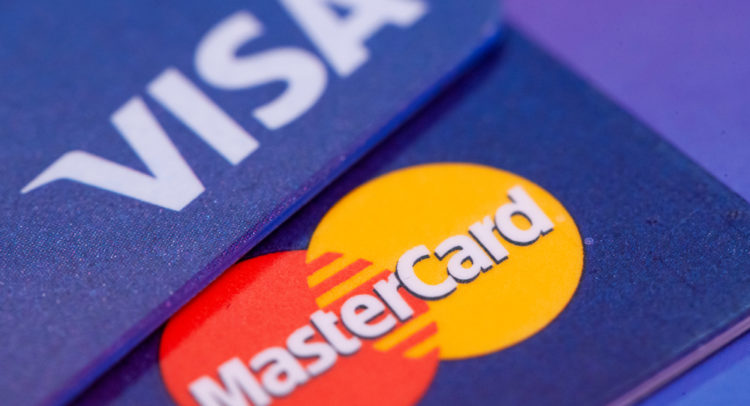Credit card behemoths Visa (NYSE:V) and Mastercard (NYSE:MA) are apprehensive about the potential passing of new legislation that could significantly reduce the processing fees they earn. Following the news, shares of both Visa and Mastercard slipped over 3% in intra-day trading on June 7.
Meet Your ETF AI Analyst
- Discover how TipRanks' ETF AI Analyst can help you make smarter investment decisions
- Explore ETFs TipRanks' users love and see what insights the ETF AI Analyst reveals about the ones you follow.
Whenever a consumer makes a payment using a credit card, the merchant pays a fee to the network processors, such as Visa or Mastercard, who facilitate the transaction through their networks. Intriguingly, these fees are determined and set by the processors themselves.
A majority of cards worldwide have either Visa or Mastercard as their network provider, in effect pocketing hundreds of billions of dollars in processing fees. Merchants have always hated these fees because they are fixed and non-negotiable.
The legislation aims to reduce these fees by allowing merchants to route transactions through different networks, other than Visa and Mastercard. So, a card listed on Visa can also be routed through a network on rivals Discover Financial (NYSE:DFS) or American Express (NYSE:AXP). This would increase competition and force these giant payment processors to reduce their fees.
Visa and Mastercard argue that the high fees are crucial to maintaining the safety, security, and convenience of card processing. While earlier attempts at passing such laws have failed, this time may be a little different. There is a possibility that both card processors will be compelled to compromise on their substantial fees in light of evolving circumstances.
Is It Better to Buy Visa or Mastercard Stock?
A comparative study of Visa and Mastercard using TipRanks tools shows that both stocks command a Strong Buy consensus rating. Also, both have a Smart Score of above 8, implying they have a high possibility of outpacing market expectations and thus can be considered good investments.
The average Visa price target of $272.68 implies 21.1% upside potential. At the same time, the average Mastercard price forecast of $433.61 implies 16.8% upside potential from current levels.

A study of their price performance charts also shows that both stocks move in tandem and are affected by the same macro and micro headwinds.

















